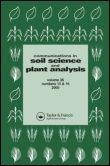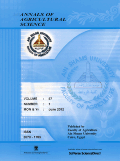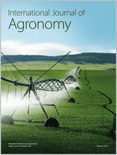
International Journal of Plant Production
Scope & Guideline
Fostering dialogue and discovery in agronomy and crop science.
Introduction
Aims and Scopes
- Sustainable Agricultural Practices:
Research on practices that promote sustainability in agriculture, including conservation tillage, organic farming, and integrated nutrient management to enhance productivity while minimizing environmental impact. - Climate Change Impact Studies:
Investigations into how climate change affects crop yields, phenology, and agricultural systems, emphasizing adaptive strategies to mitigate negative effects. - Crop Management and Yield Optimization:
Studies focusing on various crop management strategies, such as irrigation scheduling, fertilization techniques, and crop rotations to maximize yield and resource use efficiency. - Soil Health and Fertility:
Research on soil quality, nutrient dynamics, and the effects of different agricultural practices on soil health and productivity. - Economic Assessments in Agriculture:
Agro-economic analyses that evaluate the profitability, economic viability, and resource allocation in agricultural systems. - Innovative Agricultural Technologies:
Exploration of new technologies in agriculture, including the use of nanomaterials, biofertilizers, and precision agriculture techniques to improve crop production and sustainability.
Trending and Emerging
- Climate Resilience Strategies:
There is an increasing focus on developing and assessing climate-resilient agricultural practices to ensure food security under changing climatic conditions. - Precision Agriculture Technologies:
Emerging research on precision agriculture, including the use of data analytics and technology to optimize input use and improve crop management efficiency. - Soil Health and Microbial Dynamics:
Growing interest in the role of soil health, microbial communities, and their interactions with crop production systems to enhance productivity and sustainability. - Agroecological Approaches:
Research on agroecology as a holistic approach to farming that integrates ecological principles into agricultural practices is gaining momentum. - Nutrient Use Efficiency Enhancements:
There is a rising trend in studies aimed at improving nutrient use efficiency through innovative fertilization techniques and integrated nutrient management. - Socio-Economic Impacts of Agricultural Practices:
Emerging themes focusing on the socio-economic implications of agricultural practices, including farmer livelihoods, food security, and community resilience.
Declining or Waning
- Traditional Tillage Practices:
Research on conventional tillage methods has decreased as more sustainable practices like conservation tillage and no-till farming gain prominence in the context of environmental sustainability. - Single Crop Systems:
The focus on monoculture practices is declining as research increasingly emphasizes the benefits of crop rotations and intercropping systems to enhance biodiversity and sustainability. - Pesticide Use and Chemical Fertilization:
There is a noticeable reduction in studies predominantly centered on chemical inputs, as the agricultural research community shifts towards organic and eco-friendly alternatives. - Static Crop Yield Assessments:
Research that solely evaluates crop yields without considering environmental, economic, or social contexts is becoming less prevalent, as interdisciplinary approaches gain traction.
Similar Journals

BRAGANTIA
Fostering Sustainable Solutions Through ScienceBRAGANTIA, published by the Instituto Agronômico, is a distinguished open access journal that has been a vital resource since its inception in 1977. With an ISSN of 0006-8705 and E-ISSN 1678-4499, this journal is recognized for its contributions to the field of Agricultural and Biological Sciences, where it currently holds a respectable Q2 ranking as of 2023. Additionally, BRAGANTIA is indexed in various databases, supporting its impact within Materials Science (Q3 ranking). Positioned in Brazil, the journal promotes the dissemination of high-quality research, aiming to bridge the gap between academia and practical applications in agricultural innovation and sustainability. Researchers, professionals, and students looking to keep abreast of recent advancements and their implications will find BRAGANTIA to be an indispensable platform for sharing and accessing vital agricultural knowledge.

COMMUNICATIONS IN SOIL SCIENCE AND PLANT ANALYSIS
Fostering Dialogue on Agricultural Innovation and StewardshipCOMMUNICATIONS IN SOIL SCIENCE AND PLANT ANALYSIS, published by Taylor & Francis Inc, is a prestigious journal dedicated to advancing research in the fields of agronomy, crop science, and soil science. Established in 1970, the journal has maintained a significant presence over the years, with a commitment to publishing high-quality, peer-reviewed articles that contribute to the understanding of soil and plant interactions. With an impressive Q2 ranking in both Agronomy and Soil Science, it positions itself as a vital resource for researchers, professionals, and students alike, keen on exploring innovative solutions to contemporary agricultural challenges. Although it currently does not provide open access, the journal ensures wide dissemination through its established subscription services. The journal's focus on empirical research, methodologies, and technological advancements in soil management and plant nutrition makes it an essential platform for disseminating knowledge and fostering discussions within the scientific community. Located in the heart of Philadelphia, USA, it remains a significant contributor to the global dialogue on sustainable agriculture and environmental stewardship.

Agrivita
Nurturing ideas that grow into agricultural advancements.Agrivita is a distinguished, open-access journal dedicated to advancing research and knowledge in the fields of Agronomy and Crop Science. Published by Brawijaya University, Faculty of Agriculture, this journal has been providing a platform for high-quality scholarly articles since 2010. Located in the vibrant country of Indonesia, Agrivita plays a vital role in the exchange of innovative agricultural research, particularly within the Southeast Asian context. As of 2023, it holds a respectable Q3 ranking in its category, showcasing its commitment to scholarly excellence and visibility. With an increasing impact on the academic community, and its current Scopus rank placing it in the 48th percentile, Agrivita stands as a crucial resource for researchers, professionals, and students eager to deepen their understanding of crop science and agronomy. The journal's scope encompasses cutting-edge research that addresses both fundamental and applied aspects of agriculture, ensuring it remains relevant to today's pressing agricultural challenges. Its open access model enhances global accessibility, fostering a collaborative environment where diverse opinions and findings can converge.

ANNALS OF AGRICULTURAL SCIENCES
Pioneering Research in the Heart of AgricultureANNALS OF AGRICULTURAL SCIENCES, published by Elsevier, stands as a leading open access journal dedicated to the multifaceted field of agricultural sciences. Since its inception in 2011, this journal has served as a pivotal platform for the dissemination of high-quality research, covering areas such as agronomy, animal science, horticulture, food science, plant science, and soil science. With an impressive Q1 ranking across multiple disciplines and notable positions in Scopus Ranks—including #6 in Animal Science and Zoology and #3 in Horticulture—this journal is recognized globally for its significant contribution to advancing agricultural innovations. The journal caters to a diverse audience of researchers, professionals, and students, providing them with open access to cutting-edge studies that address critical issues in agricultural productivity and sustainability. Its commitment to high-impact research ensures that articles contribute meaningfully to the scientific community, fostering advancements in agricultural practices and policies.

Revista de la Facultad de Agronomia de la Universidad del Zulia
Advancing Agronomy: Bridging Research and PracticeWelcome to the Revista de la Facultad de Agronomia de la Universidad del Zulia, a key publication in the fields of Agronomy, Animal Science, Food Science, and Plant Science. Published by the Facultad de Agronomía, Universidad del Zulia, this journal aims to foster academic dialogue and disseminate impactful research that advances knowledge and practice within these disciplines. Operating under the ISSN 0378-7818 and E-ISSN 2477-9407, this journal offers a platform for both emerging and established scholars to share their discoveries and innovations. Despite its challenges, as reflected in its Q4 ranking across multiple categories in 2023, it remains a vital resource for the Venezuelan scientific community and beyond. Readers will benefit from a diverse array of studies and discussions that address contemporary issues in agriculture and related fields, helping inform best practices and policy. Engage with cutting-edge research from Venezuela and contribute to the development of agronomic sciences in the region.

International Journal of Agronomy
Advancing Agricultural Innovation for a Sustainable FutureIntroducing the International Journal of Agronomy, an influential publication in the field of agricultural sciences, established by HINDAWI LTD. With an impact factor that reflects its relevance and quality, this journal has been an essential resource for researchers and professionals since its shift to Open Access in 2009, facilitating widespread dissemination of knowledge. Based in the United States, the journal has achieved notable recognition within the academic community, currently ranked in the Q2 quartile among Agronomy and Crop Science, with an impressive Scopus Rank of #139 out of 406 in its category, representing the top 65th percentile. Spanning from 2013 to 2024, it aims to advance the understanding and innovation in agronomy through its rigorous peer-reviewed research articles, reviews, and case studies. With a commitment to enhancing global agricultural practices and sustainability, the International Journal of Agronomy stands as a vital platform for sharing cutting-edge findings that ultimately contribute to the advancement of the agronomic sciences.

Zemdirbyste-Agriculture
Nurturing the seeds of knowledge in crop science.Zemdirbyste-Agriculture is a prominent journal dedicated to advancing the field of agricultural sciences, with a particular focus on agronomy and crop science. Published by the Lithuanian Research Centre Agriculture & Forestry, this open access journal has been fostering knowledge sharing and scientific discourse since 2004, allowing researchers, professionals, and students unrestricted access to its content. Located in the beautiful country of Lithuania, specifically at Vytautas Magnus University, this journal plays a significant role in disseminating innovative research findings. With a 2023 Scopus ranking of #246 out of 406 in the category of Agricultural and Biological Sciences, Zemdirbyste-Agriculture falls within the Q3 quartile, reflecting its growing influence in the academic community. This journal, which has converged its publication focus from 2008 to 2023, aims to provide a platform for scientists to share their critical insights on agricultural practices, sustainability, and technological advancements in crop science, thereby contributing to the global discourse on food security and environmental health.

Revista Fitotecnia Mexicana
Empowering Professionals Through Cutting-Edge ResearchRevista Fitotecnia Mexicana is a prominent academic journal published by the SOC MEXICANA FITOGENETICA, dedicated to advancing knowledge in the fields of agronomy, crop science, genetics, horticulture, and plant science. With its establishment dating back to 2007 and currently running through 2024, this journal serves as an important platform for researchers, professionals, and academic institutions interested in plant genetic resources and agricultural innovations. Although it holds a Q4 quartile ranking in various categories and is positioned within the lower percentiles in Scopus rankings, it provides crucial insights and opportunities for emerging ideas and local research initiatives. Based in Mexico, and with its indexed ISSN 0187-7380, the journal plays an important role in stemming from the rich agricultural heritage of the region. The lack of open access options underscores the depth of curated content provided, making it a valuable resource for professionals seeking to expand their expertise in the sector.

Agriculture-Basel
Empowering Agricultural Science Through Open AccessAgriculture-Basel is a prestigious, peer-reviewed journal published by MDPI, specializing in the dynamic fields of agronomy, crop science, food science, and plant science. Established in 2011, this open-access journal serves as a pivotal platform for disseminating innovative research and developments in agricultural practices and technologies. With its impressive impact factor and ranking within the top quartiles in key categories, including Q1 in Agronomy and Crop Science and Q2 in Food Science and Plant Science, the journal has garnered significant attention from the research community. Its current Scopus rankings reflect its influence and importance, with notable positions in agricultural and biological sciences. Aimed at researchers, professionals, and students in the agricultural sector, Agriculture-Basel is committed to fostering a deeper understanding of sustainable practices and advancements in the field. With an emphasis on accessibility, the journal ensures that its valuable content is freely available since its inception, making it a cornerstone resource for all those engaged in contemporary agricultural research and applications.

INDIAN JOURNAL OF AGRICULTURAL SCIENCES
Fostering collaboration for sustainable agricultural practices.Welcome to the Indian Journal of Agricultural Sciences, a vital resource for researchers and professionals in the field of agricultural sciences, published by the esteemed Indian Council of Agricultural Research. Established in 1974, this journal aims to disseminate high-quality research and developments in agronomy and crop science, facilitating knowledge exchange and advancement within the agricultural community. Though currently classified in the Q4 category according to 2023 data, it provides an essential platform for publication, contributing valuable insights towards sustainable agricultural practices. With an ISSN of 0019-5022 and an E-ISSN of 2394-3319, the journal houses important research that spans decades of convergence and collaboration, promoting innovation in agriculture across India and beyond. As an open access platform, it invites contributions that reflect a wide array of agricultural disciplines to foster sustainable food systems that address the challenges of food security. Join the network of scholars and practitioners by sharing your research and engaging with the profound work being done in this transformative field.